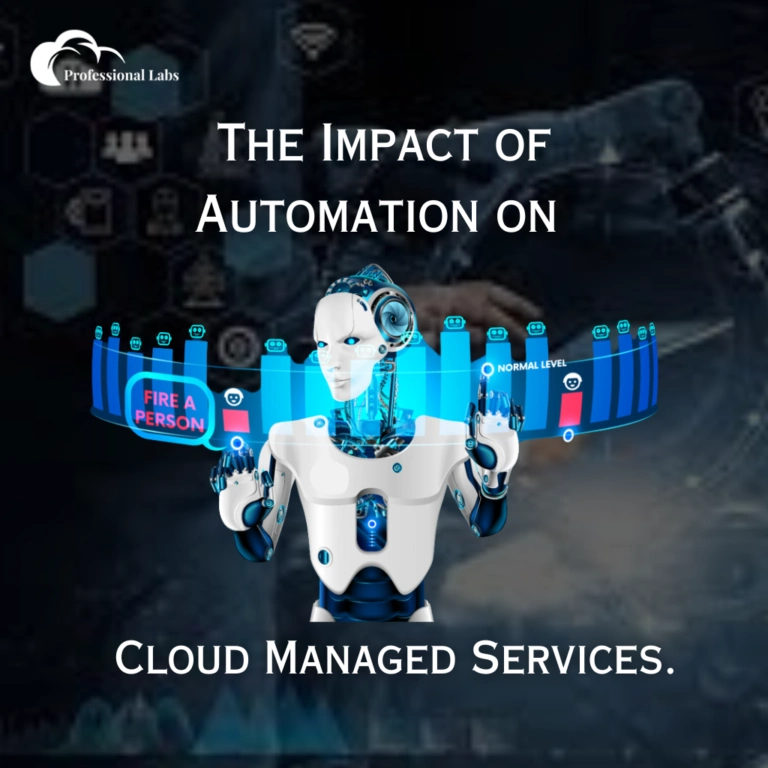- Home
- About
- Services
- Managed SOC Security Service
- Azure Virtual Desktop Service
- Defender For Endpoint Technologies To Safeguard Networks
- Cloud Managed Services
- Email Security Services Provider
- Expert Citrix Consulting Services
- IT Help Desk
- PKI Consulting
- Microsoft Cloud App Security Services
- Microsoft Defender For Identity Security Services
- Market Research Services
- Modern Workplace
- Web Development Services
- Active Directory Consulting
- Azure Cloud Managed Security Services
- IT Training Services
- CRM (Customer Relationship Management) Services
- ERP Services
- Ticketing System Service
- Partnership
- Blog
- Contact
The Impact of Automation on Cloud Managed Services

Introduction:
Imagine a society in which human ingenuity is freed from the constraints of manual labor, everyday chores are seamlessly coordinated, and system management and optimization occur at the speed of thought. Greetings from the nexus where automation and cloud technologies meet, shaping the direction of Cloud Managed Services going forward.
Welcome to the dawn of a transformative era where technology and automation are reshaping the landscape of managed services. In this digital world, companies are strategically employing automation to boost output, expedite procedures, and offer excellent customer experiences in the realm of Cloud Managed Services.
Unleashing Human Potential with Automation:
In the relentless pursuit of efficiency, businesses are turning to automation as a catalyst for change within the domain of Cloud Managed Services. Labor-intensive tasks, notorious for draining resources and time, are now seamlessly replaced by streamlined processes driven by automation. More than merely a cost-cutting tactic, this release of workers from the bonds of monotonous employment enables them to focus their knowledge and abilities on vital projects that foster innovation and expansion.
As businesses adopt automation alongside Cloud Managed Services, the dual benefit of reducing operating costs and minimizing errors becomes evident. Imagine a workforce liberated from mundane tasks, empowered to contribute meaningfully to the strategic goals of the organization, particularly in the field of Cloud Managed Services.
Automation is a Time-Saver:
Automation brings several benefits, including the conservation of valuable time and resources. Mundane IT tasks that once consumed hours of valuable work time can now be handled efficiently and effectively. Workflows become optimized, allowing for increased scalability and productivity. Automation allows businesses to achieve more with less, creating a harmonious balance between operational efficiency and human creativity.
Consider a scenario where routine tasks, such as data entry, ticket routing, and system monitoring, are seamlessly managed by automated processes. Automation not only saves time but also minimizes the risk of human error, a significant advantage in the precision-demanding environment of Cloud Managed Services.
Meeting and Exceeding Expectations with SLAs:
In the world of managed services, where customer satisfaction is paramount, meeting and exceeding Service Level Agreements (SLAs) is crucial. Automation emerges as a game-changer in this regard, ensuring that SLAs are not just met but consistently surpassed.
By automating monitoring, error detection, and ticket resolutions within the framework of Cloud Managed Services, businesses can provide a seamless customer experience. Imagine a scenario where potential issues are swiftly identified and flagged to the right team members for rapid assistance. Automation facilitates auto-assignment and auto-routing of tickets, expediting resolutions and creating a streamlined and efficient customer service process. Effective communication and bi-directional workflows, enabled by automation, significantly reduce the risk of costly human errors, ensuring the timely resolution of incidents in the Cloud Managed Services ecosystem.
The Empowerment of Enhanced Control:
Automation doesn’t replace human decision-making; instead, it enhances it. Businesses can maintain control over IT task automation within Cloud Managed Services by embedding human decision points within workflows. This ensures that critical decisions remain in human hands, striking the perfect balance between efficiency and oversight.
Consider a scenario where a process within Cloud Managed Services reaches a crucial juncture requiring human judgment. Automation empowers businesses by immediately contacting the process owner, providing them with all the necessary information to make informed decisions. This seamless integration of automation and human oversight empowers organizations to optimize processes while retaining the crucial element of human judgment in Cloud Managed Services.
Future-Forward: The Promising Landscape of Automation:
The statistics speak volumes about the future impact of automation on managed services, particularly in the realm of Cloud Managed Services. By 2025, Gartner predicts that 70% of all managed services will be delivered via automation. The consensus among IT leaders is clear, with 95% acknowledging the crucial role of automation in the future of their organizations. McKinsey’s research estimates that automation can boost productivity in managed services by 20-35%. As businesses continue to prioritize efficiency, automation stands as a key factor in shaping the future of managed services, especially within the context of Cloud Managed Services.
Consider the implications of these forecasts alongside the rising demand for efficiency within Cloud Managed Services. Automation not only streamlines operations but becomes a driving force in improving customer service within the cloud environment.
Conclusion:
As we navigate the digital transformation landscape, the role of automation in managed services, particularly in Cloud Managed Services, cannot be overstated. The adoption of structured infrastructure automation, the power of APIs in digital transformation, and the transformative impact of AI on network operations all point toward a future where efficiency, resilience, and service-oriented growth are the cornerstones of success within the cloud environment.
Embrace automation in Cloud Managed Services, unlock the full potential of your workforce, and lead your business into a future where streamlined operations and exceptional customer experiences define success in the digital age.
Feel Free and Contact Us To Know More.

